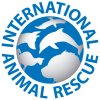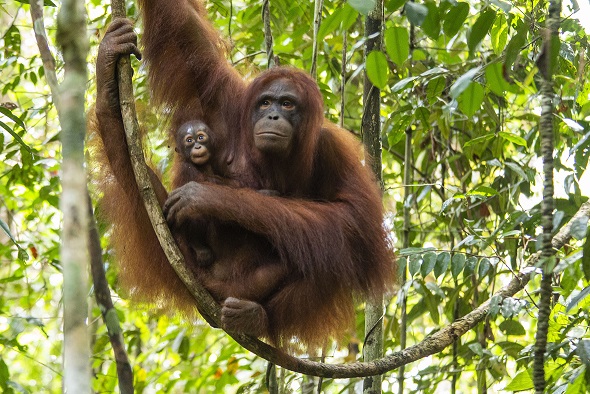
Rehabilitated orangutans give birth to the next generation in national park in Borneo.
UNITED KINGDOM / AGILITYPR.NEWS / July 20, 2020 / Rehabilitated orangutans give birth to the next generation in National Park in Borneo.
Photos and video:
https://www.dropbox.com/sh/8iqradov0z816kq/AABnzCJKsYvnelJwBrMFQEwGa?dl=0
(Shila and Surya)
https://www.dropbox.com/sh/gbmvl56grpr0yfr/AABAzS4jK5zM2qUO7I069DsPa?dl=0
(Desi and Dara)
Four years ago, in July 2016, the Bornean orangutan was listed as Critically Endangered by the IUCN (International Union of the Conservation of Nature.)
Between 1999 and 2015 numbers fell by more than 100,000.
https://www.cell.com/current-biology/fulltext/S0960-9822(18)30086-1
Now rehabilitated orangutans that have been reintroduced into the forest are giving birth to the next generation.
Groundbreaking news from a team of conservationists who run an orangutan rehabilitation programme in Borneo - not only is the programme proving successful at returning rehabilitated orangutans to the wild, it is also starting to build the next generation of orangutans in Bukit Baka Bukit Raya National Park in Borneo.
The orangutan rehabilitation project is managed jointly by NGO IAR (International Animal Rescue) Indonesia in collaboration with the centre at Bukit Baka Bukit Raya National Park (BTNBBBR) and the Natural Resources Conservation Agency (BKSDA).
Two baby orangutans have been born in the park to females that had undergone rehabilitation at IAR’s conservation centre in Ketapang, West Borneo. The females were among 46 orangutans that have been released in the TNBBBR area since March 2016. The first baby - a male that was was born to a female called Shila – was named Surya by Siti Nurbaya, Minister of Environment and Forestry. Ten year old Shila was released in TNBBBR on 9 June 2017. She had been a victim of the illegal wildlife trade in West Borneo and spent more than two and a half years in rehabilitation before she was released in Mentatai Resort in the national park.
Shila had been monitored continuously since she was released and was first seen with her new baby just days after he was born.
Then, on 10 June, 12 year old female orangutan Desi, who had been released on 26 November 2016, was also spotted by the team with a very young baby. This baby, also a male, was named Dara by the Minister.
There are always vets on standby in the area and, together with the monitoring team, they observed the mothers and babies as closely as they could without causing them undue disturbance. It was confirmed that both mothers and babies were in good health and interacting well. The females were displaying great affection and strong maternal behaviour towards their new babies.
The birth of the two baby orangutans is highly significant because it is proof of the success of the orangutan rehabilitation programme. Through the process of rescue, rehabilitation, release and monitoring IAR Indonesia has enabled Shila and Desi not only to recover from their time in captivity and return to living freely in their natural habitat, but also to start creating a new generation of orangutans in locations where previously there were no orangutans.
Karmele L Sanchez, Director of the IAR Indonesia Programme, said: "We believe that the birth of these babies is not the happy ending to the reintroduction programme. It is the beginning. The beginning of the formation of generations of new wild orangutans in the area of Bukit Baka Bukit Raya National Park. So far we have released 46 orangutans and the numbers will certainly continue to grow as more orangutans at our centre complete their rehabilitation. We’re delighted not only to be giving a second chance to orangutans that have been kept as pets, but also to be giving them the opportunity to become mothers. Mothers and infants can live freely in their natural habitat and thus also support and protect the ecology of the region.”
The Director General of the Conservation of Natural Resources and Ecosystems (KSDAE) of the Ministry of Environment and Forestry, Wiratno, said the involvement of the local community in these activities is expected to increase awareness and participation in preserving orangutans and their habitat in the National Park.
"We realise that conservation efforts cannot be done individually, we need to work hand in hand with local governments, other ministries and institutions, local communities, companies and community institutions," he added.
Agung Nugroho, Head of the TNBBBR Centre, said that through surveys and studies, they found that the forests in this area meet the requirements as new homes for rehabilitated orangutans, such as diverse plant species, ideal sea level, large area capacity, and far from access to human activities.
Alan Knight OBE, CEO of International Animal Rescue, said: “I would like to congratulate the Bukit Baka Bukit Raya National Park, the Natural Resources Conservation Agency, the Ministry of Environment and Forestry and of course the team at IAR Indonesia on this great success story which comes at a time when we can all do with some positive news to lift our spirits. Let’s hope it signals the start of an orangutan baby boom in Bukit Baka Bukit Raya National Park and many more births follow in the months to come.”
Ends.
For further information please contact Lis Key at IAR on +44 7957 824379.

Rehabilitated orangutan Shila and her new baby Surya in the Bukit Baka Bukit Raya National Park.
About Us
Our vision is a world where humans and animals coexist in sustainable ecosystems.
Our mission is to build awareness and understanding of animal welfare and conservation and develop effective systems to protect animals and their habitats.
Contacts
Lis Key
Media & Communications
lis@internationalanimalrescue.orgPhone: +44 7957 824379 Mobile: +44 7957 824379
www.internationalanimalrescue.org